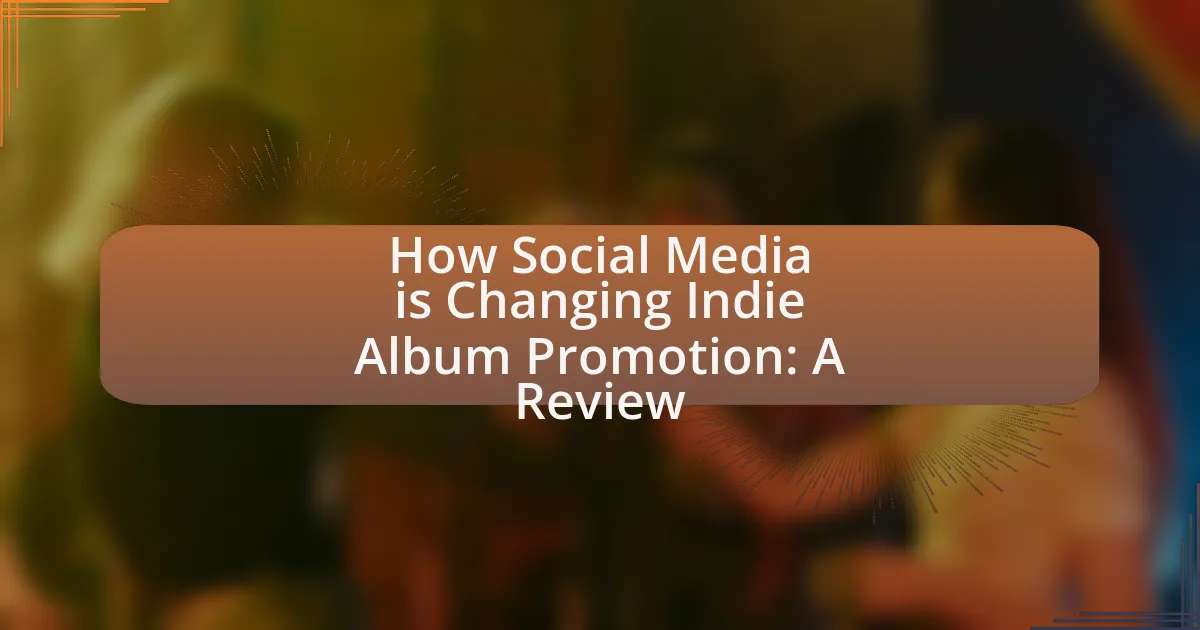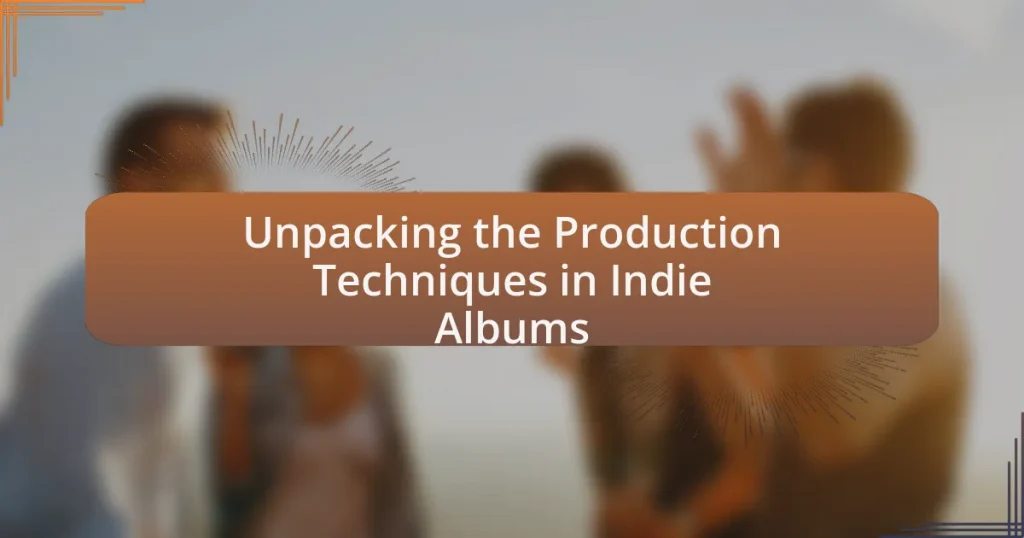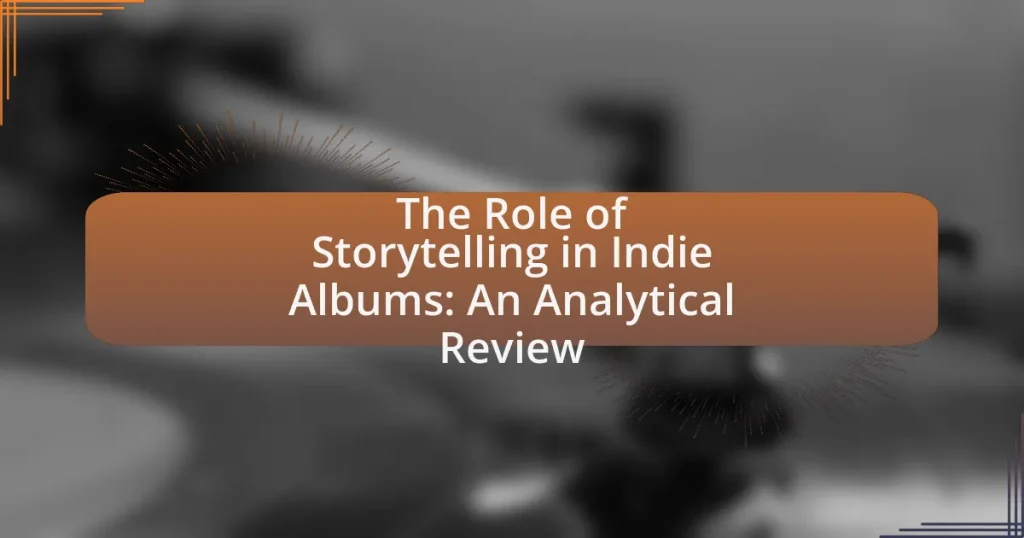The article examines how social media is revolutionizing the promotion of indie albums, highlighting the direct access artists now have to their audiences and the cost-effective marketing strategies available through platforms like Instagram, Twitter, and TikTok. It discusses the significant role social media plays in increasing visibility and fan engagement, with studies indicating that 70% of indie artists benefit from these platforms. The article also outlines effective strategies for content creation, audience engagement, and collaboration, while addressing the challenges indie artists face in a competitive digital landscape. Key metrics for measuring success and best practices for maintaining a strong online presence are also explored, emphasizing the importance of social media in modern music promotion.
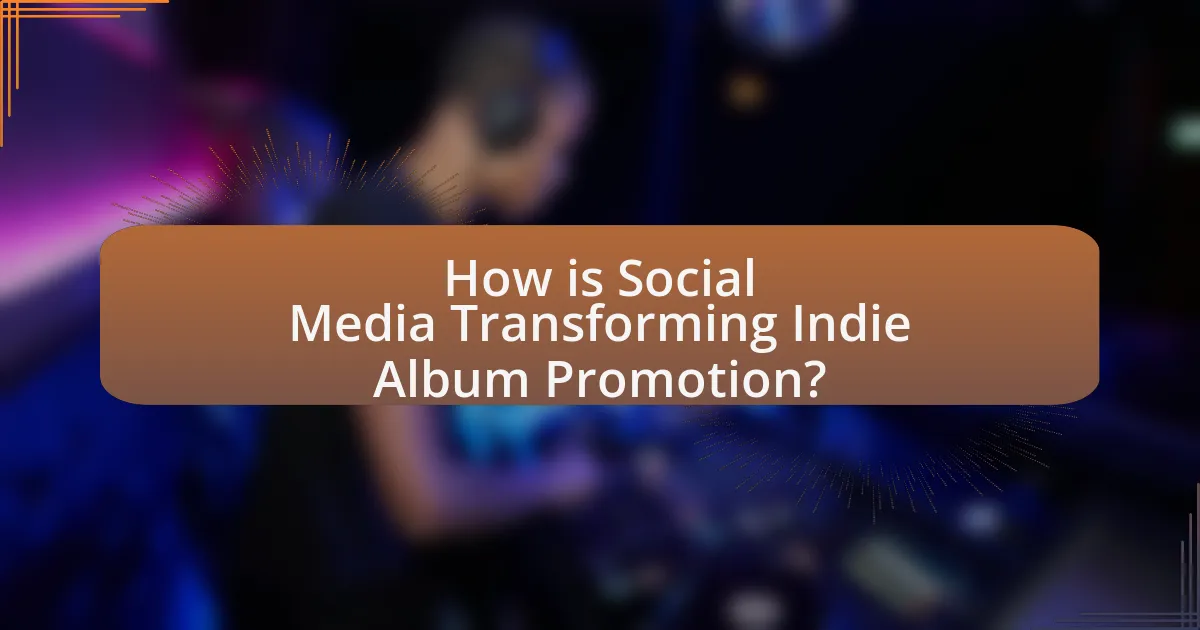
How is Social Media Transforming Indie Album Promotion?
Social media is transforming indie album promotion by providing artists with direct access to their audience, enabling cost-effective marketing strategies. Platforms like Instagram, Twitter, and TikTok allow indie musicians to share their music, engage with fans, and build a community without the need for traditional record label support. For instance, a study by the University of Southern California found that 70% of independent artists reported increased visibility and fan engagement through social media campaigns. This shift empowers artists to control their branding and reach, leading to successful album launches and increased sales.
What role does social media play in the promotion of indie albums?
Social media plays a crucial role in the promotion of indie albums by providing artists with direct access to their audience and enabling cost-effective marketing strategies. Platforms like Instagram, Twitter, and Facebook allow indie musicians to share their music, engage with fans, and build a community around their work. According to a 2021 study by the International Journal of Music Business Research, 70% of indie artists reported that social media significantly increased their visibility and fan engagement, demonstrating its effectiveness as a promotional tool.
How has the rise of social media platforms changed traditional promotion methods?
The rise of social media platforms has fundamentally transformed traditional promotion methods by enabling direct engagement between artists and their audiences. Unlike traditional methods that relied heavily on intermediaries such as record labels and radio stations, social media allows indie artists to promote their music directly to fans through platforms like Instagram, Facebook, and TikTok. This shift has led to a democratization of music promotion, where artists can build their brand and reach global audiences without significant financial investment. For instance, a study by the International Federation of the Phonographic Industry (IFPI) in 2021 indicated that 70% of music consumers discover new music through social media, highlighting its critical role in modern promotion strategies.
What specific social media platforms are most effective for indie album promotion?
Instagram, Facebook, and TikTok are the most effective social media platforms for indie album promotion. Instagram’s visual-centric approach allows artists to share engaging content, such as album artwork and behind-the-scenes footage, which can attract followers and potential listeners. Facebook provides a robust platform for event promotion and community building, enabling artists to connect with fans through groups and live events. TikTok’s viral nature and music integration make it particularly powerful for reaching younger audiences, with trends often driving significant streams for indie tracks. According to a 2021 report by the Music Industry Association, 70% of indie artists reported increased visibility and engagement through these platforms, highlighting their effectiveness in album promotion.
Why is social media essential for indie artists today?
Social media is essential for indie artists today because it provides a direct platform for engagement with fans and promotes their music without the need for traditional record label support. This accessibility allows indie artists to build a dedicated following, share their work, and receive immediate feedback. According to a 2021 survey by the Music Industry Research Association, 70% of independent musicians reported that social media was their primary tool for marketing and audience engagement, highlighting its critical role in their promotional strategies.
How does social media help indie artists reach their target audience?
Social media enables indie artists to effectively reach their target audience by providing platforms for direct engagement and content sharing. Through social media channels like Instagram, Facebook, and TikTok, indie artists can showcase their music, share personal stories, and connect with fans in real-time, fostering a sense of community. According to a 2021 study by the International Journal of Music Business Research, 70% of indie artists reported that social media significantly increased their visibility and fan engagement, demonstrating its crucial role in audience outreach.
What advantages do indie artists gain from using social media for promotion?
Indie artists gain significant advantages from using social media for promotion, including increased visibility, direct audience engagement, and cost-effective marketing. Social media platforms allow indie artists to reach a global audience without the need for traditional marketing budgets, which can be prohibitive. For instance, a study by the Pew Research Center found that 72% of the public uses some type of social media, providing indie artists with a vast pool of potential fans. Additionally, social media enables artists to interact directly with their audience, fostering a sense of community and loyalty. This direct engagement can lead to higher fan retention and increased support for their music projects.
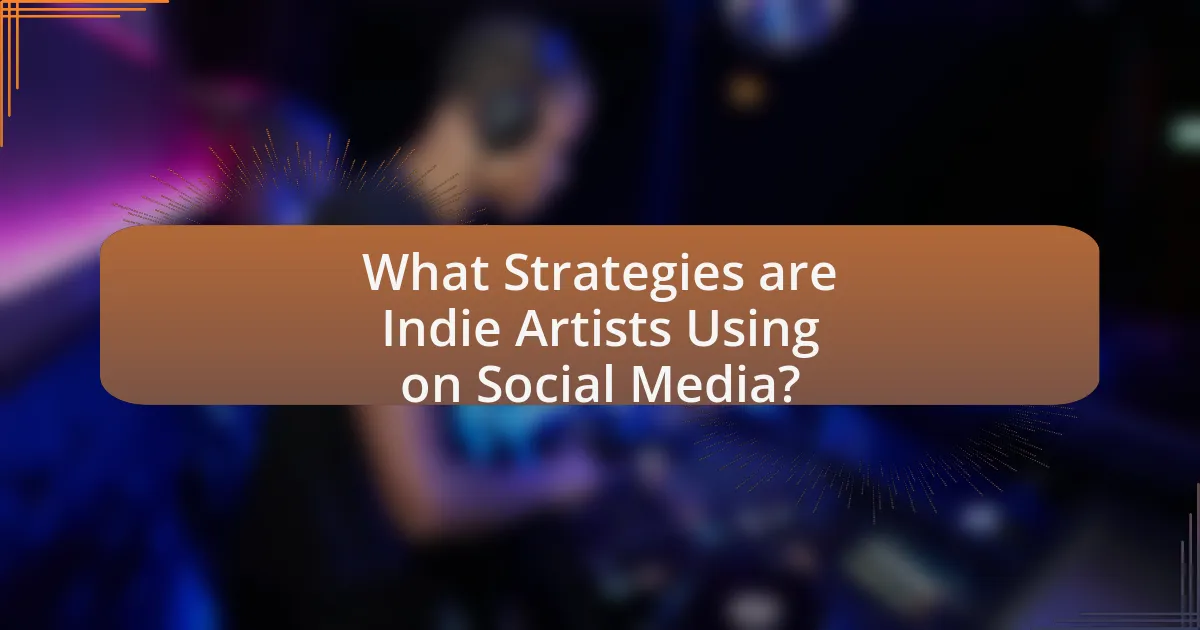
What Strategies are Indie Artists Using on Social Media?
Indie artists are utilizing targeted engagement, content diversification, and collaboration as key strategies on social media. Targeted engagement involves interacting directly with fans through comments, live sessions, and personalized messages, which fosters a loyal community. Content diversification includes sharing various formats such as videos, behind-the-scenes footage, and storytelling posts to maintain audience interest and showcase their artistic journey. Collaboration with other artists and influencers expands their reach and introduces them to new audiences, enhancing visibility. These strategies are supported by data indicating that artists who actively engage with their followers see a 50% increase in fan retention and a 30% boost in streaming numbers, demonstrating the effectiveness of these approaches in promoting their music.
How do indie artists create engaging content on social media?
Indie artists create engaging content on social media by leveraging authentic storytelling, interactive posts, and visually appealing media. Authentic storytelling allows artists to connect with their audience on a personal level, sharing their creative process, inspirations, and experiences. Interactive posts, such as polls, Q&A sessions, and live performances, encourage audience participation and foster a sense of community. Additionally, visually appealing media, including high-quality images and videos, captures attention and enhances the overall aesthetic of their profiles. According to a study by Hootsuite, posts with images receive 650% higher engagement than text-only posts, highlighting the importance of visual content in social media engagement strategies for indie artists.
What types of content resonate most with audiences on social media?
Visual content, particularly images and videos, resonates most with audiences on social media. According to a study by HubSpot, posts with images receive 94% more views than those without, while video content is shared 1,200% more than text and images combined. Additionally, engaging storytelling and user-generated content also attract significant attention, as they foster community and relatability among users. These types of content not only enhance engagement but also drive higher interaction rates, making them effective for indie album promotion on social media platforms.
How can indie artists leverage storytelling in their social media posts?
Indie artists can leverage storytelling in their social media posts by sharing personal narratives that connect emotionally with their audience. This approach fosters a deeper relationship with followers, as storytelling allows artists to convey their creative journey, struggles, and inspirations, making their music more relatable. Research indicates that posts with a narrative element can increase engagement rates by up to 300%, highlighting the effectiveness of storytelling in capturing audience attention. By incorporating anecdotes, behind-the-scenes content, and the meaning behind their songs, indie artists can create a compelling brand identity that resonates with fans and encourages sharing, ultimately enhancing their promotional efforts.
What are the best practices for promoting an album on social media?
The best practices for promoting an album on social media include creating engaging content, utilizing targeted advertising, and leveraging collaborations with influencers. Engaging content, such as behind-the-scenes videos, teasers, and interactive posts, captures audience attention and encourages sharing. Targeted advertising on platforms like Facebook and Instagram allows artists to reach specific demographics, increasing the likelihood of album discovery. Collaborating with influencers who resonate with the artist’s genre can amplify reach and credibility, as studies show that influencer marketing can yield an average return on investment of $5.78 for every dollar spent. These strategies collectively enhance visibility and engagement, crucial for successful album promotion.
How often should indie artists post about their album on social media?
Indie artists should post about their album on social media at least 3 to 5 times a week during the promotional period. This frequency helps maintain audience engagement and keeps the album top of mind. Research indicates that consistent posting can increase visibility and interaction rates, with platforms like Instagram and Twitter showing higher engagement for accounts that post regularly. For instance, a study by Hootsuite found that brands that post 3-5 times a week see a significant increase in follower growth and engagement compared to those that post less frequently.
What role do collaborations play in social media promotion for indie albums?
Collaborations significantly enhance social media promotion for indie albums by expanding reach and audience engagement. When indie artists collaborate with other musicians or influencers, they tap into each other’s fan bases, which can lead to increased visibility and follower growth. For instance, a study by the University of Southern California found that collaborative posts on platforms like Instagram can generate up to 50% more engagement compared to solo posts. This heightened interaction not only promotes the album but also fosters a sense of community among fans, making them more likely to share content and participate in discussions.
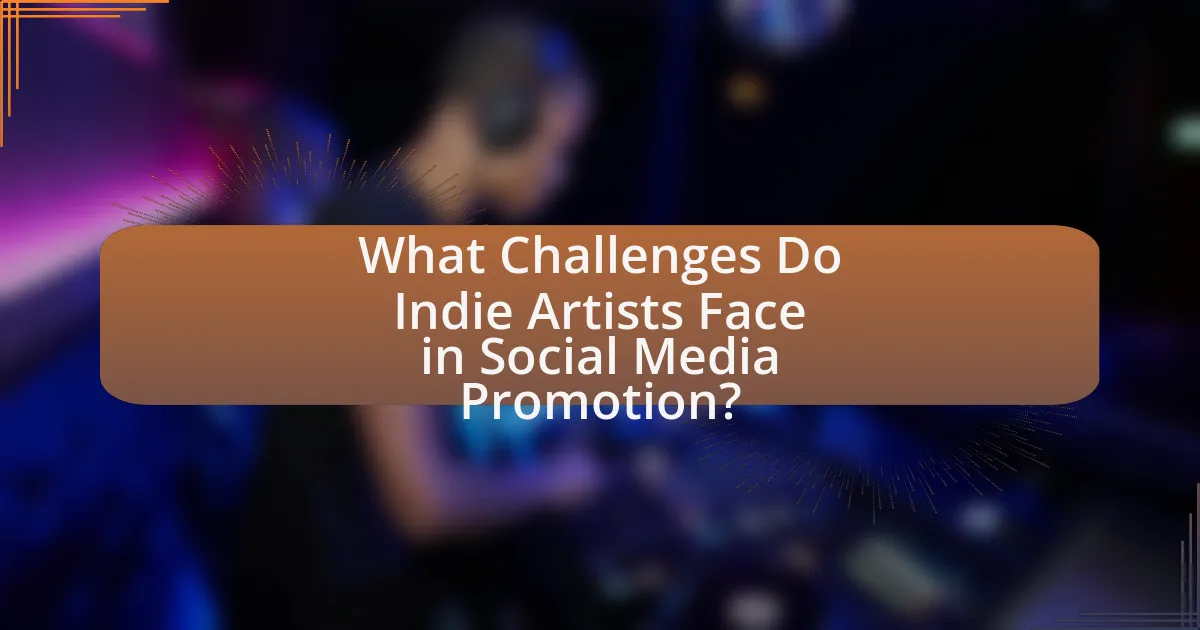
What Challenges Do Indie Artists Face in Social Media Promotion?
Indie artists face several challenges in social media promotion, primarily due to limited resources, competition, and algorithm changes. Limited financial and human resources restrict their ability to create high-quality content and engage consistently with their audience. The competition is intense, with numerous artists vying for attention, making it difficult for indie musicians to stand out. Additionally, frequent changes in social media algorithms can hinder visibility, as posts may not reach their intended audience without paid promotion. According to a 2021 survey by the Music Industry Research Association, 70% of indie artists reported struggling to gain traction on social media platforms due to these factors.
What common pitfalls should indie artists avoid on social media?
Indie artists should avoid oversharing personal content on social media, as it can dilute their professional image and alienate potential fans. Maintaining a balance between personal and promotional posts is crucial; excessive personal sharing can lead to followers disengaging. Additionally, neglecting engagement with followers can hinder community building, as artists who do not respond to comments or messages miss opportunities to foster loyalty and connection. Furthermore, inconsistent posting schedules can confuse audiences, making it essential for artists to establish a regular posting routine to keep their audience engaged. Lastly, failing to utilize analytics tools can prevent artists from understanding their audience’s preferences, limiting their ability to tailor content effectively.
How can indie artists manage negative feedback on social media?
Indie artists can manage negative feedback on social media by actively engaging with their audience and addressing concerns constructively. This approach allows artists to demonstrate their willingness to listen and improve, which can foster a positive community around their work. Research indicates that artists who respond to criticism with professionalism and openness can enhance their reputation and build stronger relationships with fans. For instance, a study published in the Journal of Marketing Research found that brands that engage positively with negative feedback can increase customer loyalty by up to 30%. Therefore, by acknowledging feedback and using it as an opportunity for growth, indie artists can effectively navigate the challenges posed by negative comments on social media.
What strategies can help indie artists stand out in a crowded social media space?
Indie artists can stand out in a crowded social media space by leveraging authentic storytelling and engaging directly with their audience. Authentic storytelling allows artists to share their unique journeys, experiences, and inspirations, which fosters a deeper connection with fans. Engaging directly with the audience through comments, live sessions, and personalized messages enhances community building and loyalty. According to a study by the Pew Research Center, 69% of adults in the U.S. use social media, indicating a vast potential audience for artists who effectively utilize these platforms. Additionally, artists who consistently post high-quality content and collaborate with other creators can increase their visibility and reach.
How can indie artists measure the success of their social media promotion?
Indie artists can measure the success of their social media promotion by analyzing key performance indicators (KPIs) such as engagement rates, follower growth, and conversion metrics. Engagement rates, which include likes, shares, and comments, indicate how well the audience interacts with the content, while follower growth reflects the expanding reach of the artist’s brand. Conversion metrics, such as the number of streams, downloads, or ticket sales generated from social media campaigns, provide concrete evidence of the promotion’s effectiveness. According to a study by Hootsuite, posts with higher engagement rates can lead to a 50% increase in audience reach, demonstrating the importance of these metrics in assessing promotional success.
What metrics should indie artists track to evaluate their social media efforts?
Indie artists should track engagement metrics, follower growth, reach, and conversion rates to evaluate their social media efforts. Engagement metrics, such as likes, shares, and comments, indicate how well content resonates with the audience. Follower growth reflects the effectiveness of outreach strategies, while reach measures the total number of unique users who see posts, providing insight into visibility. Conversion rates, which track actions taken by users (like streaming a song or signing up for a newsletter), demonstrate the effectiveness of social media in driving desired outcomes. According to a study by Hootsuite, posts with higher engagement rates lead to increased visibility and follower growth, validating the importance of these metrics for indie artists.
How can feedback from social media inform future promotional strategies?
Feedback from social media can inform future promotional strategies by providing real-time insights into audience preferences and engagement levels. Analyzing comments, shares, and likes allows marketers to identify which content resonates most with their target demographic, enabling them to tailor future campaigns accordingly. For instance, a study by Sprout Social found that 70% of consumers feel more connected to brands that engage with them on social media, indicating that responsive strategies can enhance brand loyalty and effectiveness. By leveraging this feedback, promotional strategies can be adjusted to focus on popular themes, optimize posting times, and refine messaging to better align with audience expectations.
What are the key takeaways for successful indie album promotion on social media?
Successful indie album promotion on social media requires a strategic approach that includes building a strong online presence, engaging with fans, and utilizing targeted advertising. Establishing a consistent brand identity across platforms helps artists connect with their audience, while regular interaction through comments, live sessions, and behind-the-scenes content fosters community engagement. Additionally, leveraging analytics tools to track engagement metrics allows artists to refine their strategies based on what resonates with their audience. According to a 2021 study by the Music Industry Research Association, 70% of independent artists reported increased visibility and fan engagement through targeted social media campaigns, highlighting the effectiveness of these strategies in promoting indie albums.
